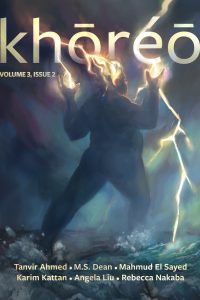Gary K. Wolfe Reviews Waste Tide by Chen Qiufan
 Waste Tide, Chen Qiufan (Tor 978-0-7653-8931-2, $26.99, 352pp, hc) April 2019.
Waste Tide, Chen Qiufan (Tor 978-0-7653-8931-2, $26.99, 352pp, hc) April 2019.
In last year’s The Reincarnated Giant: An Anthology of Twenty-First-Century Chinese Science Fiction, co-editor Mingwei Song writes in his introduction, “The single most important change in recent years in the English-language translations of Chinese science fiction has been the unrivaled devotion and efforts of Ken Liu.” It’s a generous assessment, but pretty indisputable. Not only is Liu an extraordinarily graceful writer in English, but he’s acutely aware of the nuances of variations in Chinese regional language patterns (which he calls “topolects”) and somehow renders these into seamless sentences and paragraphs that neither fall into the old Ezra Pound translator-as-poet philosophy of “make it new” nor into the more common academic trap of arthritic but meticulously literal prose – at least that’s the way it looks from the perspective of readers who, like myself, have nothing to go on but what the English looks like from this end. One indication of Liu’s apparent faithfulness to his sources is that the style of Chen Qiufan doesn’t read at all like the style of Liu Cixin, whose Ken Liu-translated The Three Body Problem probably did more to put Chinese SF on the world map with its Hugo Award a few years ago than anything else.
With several stories translated in Clarkesworld, Lightspeed, F&SF, and both of Liu’s recent anthologies of Chinese SF (Invisible Planets and Broken Stars), Chen Qiufan isn’t an entirely new name for English-language readers, but his first novel Waste Tide, translated by Liu, has its share of surprises. Originally published in Beijing in 2013 as The Waste Tide, it takes place almost entirely on a grim coastal island called Silicon Isle, which is essentially one giant landfill for electronic waste, where local gangs and international corporations brutally exploit the thousands of subsistence-level workers they contemptuously call “waste people.” The air is thick with smoke and ashes from burning plastic and acid baths, the water is black or dark green and filmed with polyester, and no one wears any protective gear. That would be disturbing enough, like a Paolo Bacigalupi nightmare, until you realize that this isn’t the speculative part of the novel: the setting is closely based on the actual town of Guiyu, not far from where Chen grew up, which is apparently the largest e-waste site in the world, and where thousands of exploited subsistence-level workers eke out a living in exactly such a toxic environment (though there have apparently recently been a few improvements). The line between documentary realism and SFnal extrapolation here is deliberately blurred, as we learn that some of the workers sport stylish “body films,” temporarily escape their bleak lives with the aid of cheap augmented-reality goggles, or freely make use of prosthetics.
But those prosthetics turn out to be a new kind of hazard. As a project director explains to a visiting American, “The rich switch body parts as easily as people used to switch phones,” and the old prosthetics, often still containing blood or bodily fluids and potential bacteria or viruses, get shipped to Silicon Isle along with everything else. Some of the robotic arms and exoskeletons are still functioning, creating mechanical as well as biological hazards. One such prosthesis turns out to be the maguffin that eventually opens up the plot to conspiracies and cover-ups that date back as far as WWII, and which might even augur a kind of posthuman biotech revolution. The central figure is Mimi, a resourceful but desperately poor waste girl who inadvertently becomes the target not only of an ambitious corporate exploiter, but also of a superstitious and ruthless gang leader who has been told by a local witch that Mimi is needed for a ritual which may help his ailing son. The class distinctions throughout the novel are stark, but the characters are hardly one-dimensional: Scott Brandle, the American who arrives on Silicon Isle in hopes of landing a lucrative contract to automate many of the island’s recycling practices, is haunted by the death of a daughter whom he might have saved, while his translator, the Chinese-American Chen Kaizong, initially hopes to learn more of his own heritage but begins falling for Mimi. Liu Jincheng, the boss of one of the three clans who actually run the island, is convinced that ruthlessness is what has enabled him to escape his own earlier poverty, though his goons, especially the pathological Knifeboy, are more standard-issue pulp villains. Rounding out the main cast is Li Wen, or Brother Wen, who seeks to organize the waste people into something resembling a labor movement.
Scene by scene, Waste Tide moves along at a terrific pace, with some harrowing scenes (especially one involving Mimi’s capture and torture at the hands of Knifeboy) and mostly flawless pacing that continually spirals the plot outward, with ever-increasing stakes. Chen is clearly familiar with SF traditions – there are allusions to Bradbury and Lovecraft, and indirectly to William Gibson – and with cutting-edge tech. His fascination with Gibsonian coolhunting leads to a few awkwardly placed infodumps in the latter part of the novel, and occasionally a scene will stop dead in its tracks as Chen gets tangled in his own technical ingenuity. The key transformation in the novel involves Mimi, a giant exoskeleton, and one of those rogue viruses, and at one point, when the newly empowered Mimi is trying to infiltrate communications networks with only seconds to spare before being discovered, we’re treated to sentences like “The C-band used by the VSAT system overlapped in part with the frequencies used by terrestrial microwave trunk lines, while the Ku-band, which had higher frequencies, was severely impeded by rain fade.” “Rain fade” could also be a description of what happens to the reader confronted with such tech-specs in the middle of a suspenseful moment. For the most part, Chen keeps this under control, while providing satisfactory frissons for the hard-geek-SF readers. Most of the rest of us, though, want to get on with the details of Mimi’s revenge against her tormentors, and that revenge turns out to be pretty spectacular. For a novel that begins with the unlikely prospect of waste-disposal as an engine for high-concept SF, Waste Tide turns out to be a complex and provocative exploration of the interactions among social class, corporate ambition, cultural identity, environmentalism, and human potential, with enough buzzy ideas to power a couple of novels, and enough violent melodrama to keep the reader plummeting along.
Gary K. Wolfe is Emeritus Professor of Humanities at Roosevelt University and a reviewer for Locus magazine since 1991. His reviews have been collected in Soundings (BSFA Award 2006; Hugo nominee), Bearings (Hugo nominee 2011), and Sightings (2011), and his Evaporating Genres: Essays on Fantastic Literature (Wesleyan) received the Locus Award in 2012. Earlier books include The Known and the Unknown: The Iconography of Science Fiction (Eaton Award, 1981), Harlan Ellison: The Edge of Forever (with Ellen Weil, 2002), and David Lindsay (1982). For the Library of America, he edited American Science Fiction: Nine Classic Novels of the 1950s in 2012, with a similar set for the 1960s forthcoming. He has received the Pilgrim Award from the Science Fiction Research Association, the Distinguished Scholarship Award from the International Association for the Fantastic in the Arts, and a Special World Fantasy Award for criticism. His 24-lecture series How Great Science Fiction Works appeared from The Great Courses in 2016. He has received six Hugo nominations, two for his reviews collections and four for The Coode Street Podcast, which he has co-hosted with Jonathan Strahan for more than 300 episodes. He lives in Chicago.
This review and more like it in the April 2019 issue of Locus.
 While you are here, please take a moment to support Locus with a one-time or recurring donation. We rely on reader donations to keep the magazine and site going, and would like to keep the site paywall free, but WE NEED YOUR FINANCIAL SUPPORT to continue quality coverage of the science fiction and fantasy field.
While you are here, please take a moment to support Locus with a one-time or recurring donation. We rely on reader donations to keep the magazine and site going, and would like to keep the site paywall free, but WE NEED YOUR FINANCIAL SUPPORT to continue quality coverage of the science fiction and fantasy field.






